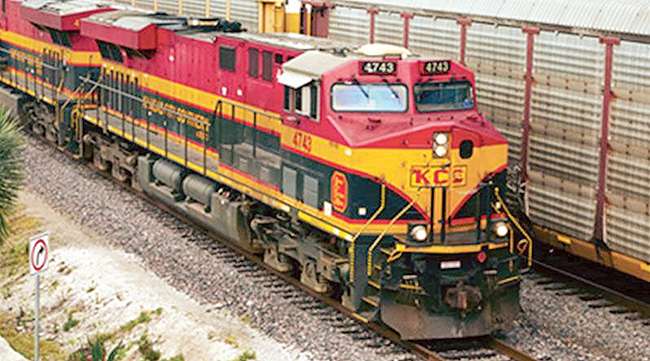Senior Reporter
KCS Performance Slips in Q2 Amid Planned CN Merger

[Stay on top of transportation news: Get TTNews in your inbox.]
Kansas City Southern, the Class I freight railroad much sought-after by two Canadian rivals, reported a second-quarter loss stemming in part from costs related to its impending merger.
The company lost $378.5 million, or a loss of $4.16 a share, compared with a year-ago profit of $109.7 million, or $1.16.
Included is $720 million in merger-related costs tied to its $33.6 billion acquisition agreement with Canadian National Railway announced in May.
Revenue in the quarter was $749.5 million compared with $547.9 million last year.
Operating expenses soared to $1.18 billion, compared with $367.5 million a year ago.
In March, KCS announced it planned to merge with CN rival Canadian Pacific for $25.8 billion. But KCS withdrew from that agreement after the larger bid from CN. As part of the termination, though, KCS had to pay a $700 million fee to CP.
KCS officials said they expect that money eventually will be reimbursed once shareholders of KCS approve the final merger plan — but in the second quarter KCS had to pay that fee.

Ottensmeyer
“KCS delivered strong second-quarter volume growth as our franchise benefited from unique growth drivers and the economy recovered from the COVID-19 downturn,” said CEO Patrick Ottensmeyer. “Although we are pleased with the strong volume growth, we fell short of our own expectations for customer service.”
KCS’ operating ratio soared to 157.6% compared with 67.1% a year ago. (Operating ratio measures operating expenses as a percentage of revenue and determines efficiency. The lower the ratio the more ability the company has to make a profit.)
Company officials acknowledged the railroad’s operation was not nearly as strong as they would have liked.
“Our operating team is focused on implementing structural and sustainable changes that will improve operational performance and the resiliency of our network. To that end, we have deployed additional assets and crews in support of our service recovery, setting the company up to continue delivering robust volume growth while improving customer service in the second half of 2021,” Ottensmeyer said.
Kansas City Southern is the smallest of the six Class I railroads based on annual revenue and it saw total carload volumes increase 31% year-over-year as freight shipments surged.
Patrick Donnelly, analyst with financial services company Third Bridge, told Transport Topics that severe impact to the results came from the anticipated merger and operational difficulties.
“The biggest detriment was obviously the $700 million-plus in merger costs they experienced,” he said. “But their performance aside from that was not excellent, even in a very favorable freight environment and falling short from an operations perspective.”
Donnelly said though one of KCS’ greatest assets is its Mexico operations, the country has been very difficult to work with.
“Their access to Mexico is both a gift and a curse,” he said. “There is an attractiveness to have access to the Mexican market and be a primary freight mover across the border. But those tracks, and within Mexico, is where a lot of the delays are driven. There are border crossings, so [U.S. Customs and Border Protection] are involved. There are different regulatory bodies they’re dealing with in Mexico and there simply is congestion in the yards they’re dealing with.”

How do you care for your tires? Host Michael Freeze sets out to answer what factors fleets should consider when investing in TPMS and ATIS. He's joined by Matt Wilson of Hendrickson. Hear a snippet above, and get the full program by going to RoadSigns.TTNews.com.
Company officials said they’re taking steps to improve dwell times at rail yards in Monterrey and Nuevo Laredo, Mexico, and that operations will show substantial improvement in the third quarter.
Of the proposed CN merger, Donnelly said the recent Executive Order signed by President Joe Biden calling for more competition in the shipping and transportation industry, including freight railroads, lowers the odds to 50-50 that the KCS-CN merger will be approved by the U.S. Surface Transportation Board, which is expected to vote on the proposal next year.
“I think that any potential transaction from this point forward under the Biden presidency is going to get much more attention than it would have historically,” he said. “There is now a microscope on this particular deal.”
By sector, KCS said quarterly revenue from chemical and petroleum shipments increased 47% to $232.5 million from $158.5 million.
Industrial and consumer product revenue increased 20% to $144.6 million from $120.6 million.
Agriculture and minerals rose 22% to $139.9 million from $114.4 million.
Energy revenue increased 39% to $54.5 million from $39.3 million.
Intermodal revenue jumped 43% to 91.1 million from $63.5 million.
Automotive shipment revenue soared by 217% to $49.4 million from $15.6 million.
Want more news? Listen to today's daily briefing below or go here for more info:




